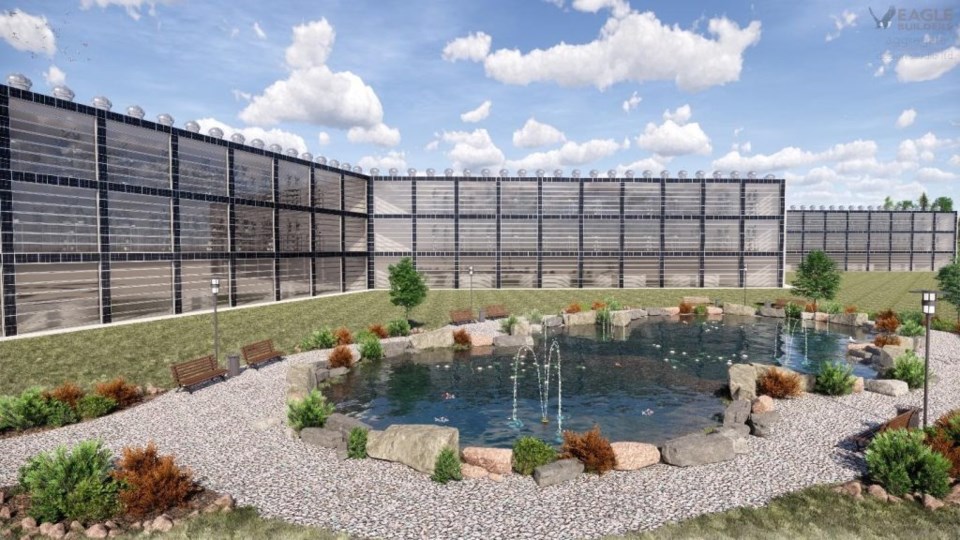Scott Hayes, Local Journalism Initiative Reporter | [email protected]
What started as one Calgary company’s effort to extract a renewable energy source has now turned into a combined food security venture with its eyes looking storeys high.
Development on the Latitude 53 project began a few years ago as a new geothermal energy extraction operation coming to Hinton. It is now preparing to combine that into a vertical farm now that Alberta Energy gave Novus Earth Energy Operations the go-ahead with approval with subsurface geothermal rights. That's the first step before its proposal submission to the Alberta Energy Regulator for the surface lease and license to drill an exploratory well.
Jeff Messner, president and co-founder of Novus, said that it’s all about deriving the greatest benefit for the company and for the public at large. It’s all because of what lies underneath the town.
“We were looking at it as just for the geothermal possibility, but then when we were looking at the economics, we know that Hinton is a geothermal anomaly. We think it's probably one of the hottest temperatures in Alberta,” he said.
“It's possible that when you get into northwest Alberta that it's a bit better, but there's no one around.”
Ultimately, just selling electricity to the grid didn't really make enough economic sense for the Novus team. Far from wanting to abandon the prospect of getting to Hinton’s geothermal resources, Messner and his partners instead expanded the concept.
Co-founder and partner Ralph Salm previously had a business idea for a vertical farm in Red Deer. The financial projections for that didn’t look so rosy either once the costs of heat and electricity were added into that business plan.
Instead, the energy-hungry farm was added on to the plans for Hinton’s geothermal tap. The self-contained closed loop well will bring in enough electricity and thermal energy to sustain the farm while producing an energy surplus that can be sold back to the grid.
The vertical farm on top will feature several fruits and vegetable crops grown hydroponically – including lettuce, tomatoes, peppers, chard, strawberries and raspberries – with an added aquaculture facility to raise Pacific white shrimp.
Messner said he is looking forward to eating shrimp again. He stopped eating them after learning from his own research how unhealthy most available shrimp are to eat. The ones that come from Latitude 53 will be good quality shrimp with no diseases.
Everything will be grown without chemicals or pesticides and the food production will continue year-round, meaning exponentially increased yields bringing food crops to the market every few weeks. Lettuce, for instance, can grow to full heads in two weeks or less. Deliveries could be made to grocery stores every two days as they anticipate producing in excess of six million kilograms of produce and more than 500,000 kilograms of shrimp annually.
Basically, you set your growing conditions to be June 21 every day of the year with no clouds, Messner said. Those perfect growing conditions are ameliorated by the fact that you can control the amount of nutrients the crops get, which results in really good quality fruits and vegetables.
For Messner and Novus, being able to add food security to Latitude 53’s list of benefits is icing on the cake. They foresee supplying food not just locally (including to Jasper) but also up to the Northwest Territories where food is already prohibitively expensive.
“We wanted to do geothermal because it's a good renewable energy source, but we have to make sure that it's economical and providing good food, too,” Messner said.
“What we found out, there's so many areas within Alberta – within Canada – that are these desert communities that aren't getting good quality food. It all just fit in and made sense.”
Novus is close to determining exactly where it wants its surface location for the wellsite to be. Once that has been achieved, it will set about finding a suitable location for the vertical farm. Messner expects that the wellsite should be drilled by early 2023.
The company will be using repurposed old seismic lines, confirming its commitment to time-honoured environmental actions like recycling. Drawing geothermal energy is clean with zero emissions, he said, adding that he already has hopes to expand the project in the future.
It will start with the generation of 3.1 megawatts of electricity and 20 to 30 megawatts of thermal energy. They estimate more than 200 construction jobs will be created for the project, with another 120 full-time jobs once the well and the farm are both operational.
Editor's note: The project currently has subsurface geothermal rights, not approval from the exploratory drilling phase to begin as originally reported.




